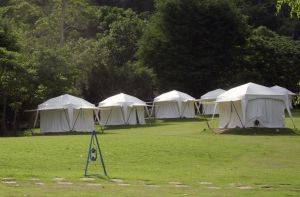Keeping Your Camp Grounds Clean and Pristine
Welcome, one and all, to the AllCampgrounds.com blog! Today we’ll be talking about one of the most important parts of getting by at all campsites: managing your presence.
We’ll look at a few of the keys to making sure you and your fellow campers leave nature as you found it.
Consider this a review for old hands and a great way for newcomers to camping to learn the ropes.
“Leave No Trace”: Learn It, Live It, Love It
The old dictum has actually been expanded into a pretty useful website on environmental ethics courtesy of The Leave No Trace Center. Of course, it’s not really possible to leave NO trace at all; humans and animals are bound to leave footprints and small signs of passing that no one can control. For everything else, there are a few simple rules that anyone can master …
A Checklist for “Doing Right” by Mother Nature
Know your stuff about foodstuff. Just ask any resident of New York City what happens when an animal species becomes all too familiar with humans and their food: they get surly, demanding, and eventually, aggressive. One of the easiest and most common ways to provoke a negative encounter with wildlife is with improper cooking and storage of foodstuffs.
If you’re cooking in an area where larger animals are known to roam, do it a reasonable distance downwind from your camp. Leftovers and waste should be safely stored in a tamper-proof container that seals tight to prevent scents from attracting animals. Don’t forget that small animals, such as raccoons, can be just as persistent as larger ones about getting into your dinner! Never bury food waste, as many animals can still smell it.
Most importantly, never, ever feed any wild animal.
Be extra vigilant of your dog. The number of camp grounds that allow domestic animals such as dogs and cats is on the rise, and virtually all campsites welcome service animals. But be aware that, no matter how well trained, your dog can agitate the local wildlife if left unchecked. In the wild, your dog answering the “call of nature” could be interpreted as a hostile scent marker, so remove all waste as soon as you can. Likewise, if your animal gets loose, he or she can lead other creatures right back to your campsite, so be sure to leash like you would in any public space.
Don’t disturb or remove anything: It’s fun to observe nature, but if nature is observing you back, you might be too close. Don’t succumb to the temptation to interfere with the local habitat. Even simple parts of the ecosystem like plants, berries, pine cones, and logs have plenty of significance to the creatures that use them for food or nesting. If activities like bird-watching are on your agenda, bring equipment like binoculars and cameras that will allow you to keep a safe distance. Fishing enthusiasts, consider catch-and-release.
Don’t leave anything behind. Be especially sure to double and triple-check your doused fires, ensuring there are no live embers left behind. Smother flames completely with water, sand, or dirt to be completely sure. Take away everything you bring in, and dispose of waste at approved dump sites. Anything that is left behind could act as “signposts” for curious animals, making camp grounds less secure in the future.
At all campsites, awareness and respect are the keys to getting along with nature. Make a little extra effort to know the land, and you might find a second home in the wild that will be “just the way you found it” for years to come.



I liked this article. The last thing my friends and I do when leaving a campsite is give the whole place a visual check so nothing gets left behind. All trash, tent stakes, cords and miscellaneous small items are accounted for that way. (That includes stuff other people have left behind!) The fire, if we had one, is completely out, and the site is cleaner than it was when we arrived. Does it even have to be said that there’s no excuse for driving nails into trees??
Comment by Ratty — September 5, 2010 @ 8:19 pm